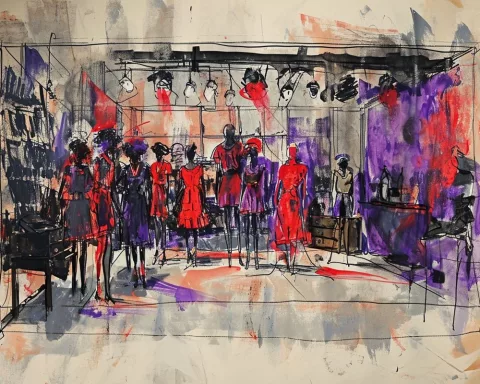Taraji P. Henson, a black Hollywood actress, recently spoke out about the pay imbalances she has endured throughout her career, bringing attention to systemic racial and gender pay disparities. Her emotional discussion highlights the urgent need for transformation in the industry. Henson’s advocacy and willingness to expose these issues are essential in advocating for change and ensuring a fairer path for the upcoming generation of black actresses. Her forthright revelation calls for systemic change and serves as an alarm bell for the industry to self-reflect and rectify these imbalances.
Taraji P. Henson recently disclosed the pay imbalances that she, as a black Hollywood actress, has endured throughout her career. Her emotional discussion brings attention to the systemic racial and gender pay disparities in Hollywood and highlights the urgent need for transformation. Henson’s advocacy and willingness to expose these issues are essential in advocating for change.
During a time when discussions about pay disparity, racial bias, and widespread injustice are escalating, the cinematic industry is not an exception. Taraji P Henson, an acclaimed American actress, recently brought attention to this critical issue, disclosing the pay imbalances that she, as a black Hollywood actress, has endured throughout her career. Her heartfelt radio discussion with Gayle King in December 2021, where Henson bravely addressed her professional life’s harsh realities, symbolizes the perennial struggle Hollywood has with ensuring fair pay and respect for all its talent.
The Emotional Toll of Pay Disparity
Henson, celebrated for her performances in “Hidden Figures” and “Empire”, exposed the emotional burden of this inequality. When questioned about her potential retirement plans, she took a moment to express her exhaustion from relentless work without earning adequate remuneration. This fatigue emanates not only from her occupation’s physical demands, but also the psychological trauma of underpayment and diminished recognition. “I’m just weary of working so hard, being proficient at what I do [and] receiving a fraction of the cost”, Henson asserted, her sentiments reverberating with numerous minority individuals in the international movie industry.
This fatigue is intensified by the financial strain of maintaining a prominent career. Henson unveiled this often-disregarded facet of her life, emphasizing that her salary has to not only cover her personal expenses, but also the remuneration of her professional team. To sustain her success, she relies on a team comprising agents, publicists, and other personnel, who take approximately 30 percent of her income. After paying her team and deducting taxes, she estimated that only 20 percent of her earnings actually ends up in her bank account.
Unseen Labor and Undervalued Work
Henson’s dialogue emphasized the significant point about the observable and hidden labor of acting. She mentioned the immense volume of her work, which she must do to sustain her living. “I hear people say, ‘You work a lot.’ I have to. The figures don’t add up,” she expressed, highlighting the inconsistency between her workload and her remuneration. Her proclamation exposes a troubling reality—despite remarkable performances and critical recognition, she, like numerous black actors, remains inadequately compensated.
Reflecting on her career journey, Henson voiced her frustration at the repeated pattern of her professional path. Despite numerous achievements and persistently shattering glass ceilings, she finds herself treated like a beginner when renegotiating contracts. “I’m merely human, and it seems every time I accomplish something, and I break another barrier, when it’s time to renegotiate, I’m treated like a beginner again as if I never achieved what I just did,” she confessed.
Advocacy Amid Disappointment
Henson’s admission is not just her personal experience, but symbolizes the common experiences of many black actors in the movie industry. Her declaration echoes the sentiments of many who feel their work is undervalued, underappreciated, and inadequately remunerated. “I’m tired of hearing my colleagues express the same complaints repeatedly,” Henson confessed.
Sharing her experiences, Henson not only underscores her personal battles but also advocates for the actresses following her footsteps. Despite her exhaustion and disillusionment, her resolve for advocacy remains strong. She questioned, “If I can’t champion for those coming after me, then what am I doing?”, demonstrating that her professional journey’s core is a commitment to ensuring a fairer path for the upcoming generation of black actresses.
A Call for Systemic Change
Taraji P Henson’s forthright revelation provides a stark portrayal of the persistent racial and gender pay disparities in Hollywood. Her words serve as an alarm bell for the industry to self-reflect and rectify these imbalances, emphasizing the urgent requirement for systemic transformation. Her resilience and willingness to use her influence to expose these issues are not just worthy of praise but essential in advocating this change. As the movie industry continues dealing with these challenges, the voices and experiences of actors like Henson must be prioritized in the discourse.
What did Taraji P. Henson disclose about her career in Hollywood?
Taraji P. Henson recently disclosed the pay imbalances that she, as a black Hollywood actress, has endured throughout her career.
What issue did Taraji P. Henson bring attention to?
Taraji P. Henson’s disclosure brought attention to the systemic racial and gender pay disparities in Hollywood.
What did her emotional discussion highlight?
Her emotional discussion highlighted the urgent need for transformation in the industry.
Why is Henson’s advocacy and willingness to expose these issues essential?
Henson’s advocacy and willingness to expose these issues are essential in advocating for change and ensuring a fairer path for the upcoming generation of black actresses.
What does Henson’s revelation call for?
Henson’s forthright revelation calls for systemic change and serves as an alarm bell for the industry to self-reflect and rectify these imbalances.
What is the significance of Henson’s dialogue?
Henson’s dialogue emphasizes the significant point about the observable and hidden labor of acting, highlighting the inconsistency between workload and remuneration.










